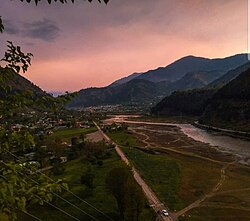Karnol
This article has multiple issues. Please help improve it or discuss these issues on the talk page. (Learn how and when to remove these template messages)
|
Karnol
کرنول UC/VC Karnol | |
|---|---|
Village and union council | |
 View of Karnol from Banglaw Hills | |
| Coordinates: 34°23′N 73°23′E / 34.383°N 73.383°E | |
| Country | Pakistan |
| Province | Khyber-Pakhtunkhwa |
| District | Mansehra District |
| Region | Upper Pakhli |
| Preceded By | Chief of Swatis |
| Succeeded By | West Pakistan |
| Founded by | Khankhail Swati Family[citation needed] |
| Government | |
| • Nazim ناظم | Shoukat Nawaz Khankhail[citation needed] |
| • Chairmain چیئرمین | Sajid Ali Khankhail[citation needed] |
| Time zone | UTC+5 (PST) |
Karnol is a village and union council (an administrative subdivision) of Mansehra District in the Khyber-Pakhtunkhwa province of Pakistan.[1] It is located at an altitude of 797 metres (2618 feet)[2] lying in the south east of the district near to Abbottabad and the Kashmir frontier and lies in an area affected by the 2005 Kashmir earthquake.[3] Ameer-Ullah Khan the elder son of Habibullah Khan I and grandson of Sa'adat Khan who was the first ruler of pakhli (1762-1780) under Durrani Empire & nominal Chief of Swatis founded this village.





Land Revenue[edit]
The Village Karnol was founded by Jageerdar Khan Ameer-Ullah Khankhail so there were no owners except Khankhail family in villages, Karnol and Baralkot and all of the revenue of these villages was given to them. After 1965 when Qayyyum Khan become Minister then some people transferred lands to their names in Karnol and Brarkot. Khans of Karnol had given free lands to Government for offices like Nadra Office,PatwarKhana and other educational institutes. The Khankhail family are leading tribe of village Karnol and have done a lot of work for the people of their area.
Gallery[edit]









Governance[edit]
1.Feudalism (خانگی,جاگیرداری)
As in 2023,The feudalism is not very functional as it was before,but still many important decisions are taken by the headmen of Tribe Khankhail through Jirga (جرگہ:- a term used mostly in Afghanistan/KPK for settlement of disbutes)
2. Village Council
Candidates securing highest and second highest number of votes in the election to the general seats of the village council or the neighbourhood council shall respectively be elected as the Nazim and Naib Nazim of the village council or the neighbourhood council.

• Sajid Ali Khankhail was elected Chairmain of Village Council Karnol in the last Local Body Election and won by majority votes.
Famous Sites[edit]
• Dewri Khan Sahib
• Hujra Shoukat Nawaz Khankhail
• Sarwar Khankhail Cottage
• Banglaw Hills
• Bela (Playground/Garden)
• Jamiah Masjid,Khan Dewri
Neighbourhood[edit]
1.Mohallah Dewri Khan Sahib
2.Mohallah Sarwar Khan abad
3.Purana Karnol (mostly inhabited by Syeds)
4.Mohallah Thanger
5.Jabbi
6.Mohallah Jab
7.Mohallah Sardaran
8.Mohallah Chahm
9.Bani
10.Purzen
11.Dakbanglaw
12.Gali
13.Mohallah Cheeran
14.Mohallah Laryan
Historical Background[edit]
When Sa'adat Khan became the first ruler of Pakhal (1762–1780)[citation needed], he founded a village known as Garhi Sa'adat Khan on the banks of Kunhar River. The village is now known as Garhi Habibullah. Habibullah Khan(I) was chief of the Swati tribe and had three sons: Ameer-Ullah Khan (Karnol), Muhammad Ameen Khan (Garhi Habibullah Khan), and Dost Muhammad Khan (Tarkanal).[citation needed]
After the death of Habibullah Khan (I), by the Code of Swatiwali/Pashtunwali wali the oldest son have a right to become the next Chief of tribe.[citation needed] Ameer-Ullah Khan was the oldest son and had a right to become the new Chief of Swati tribe, Kursi Nasheen کرسی/گدھی نشین of Garhi Habibullah[citation needed] but he was religious type person,so he gave his Chieftainship and Khanate to his younger sibling Muhammad Ameen Khan. The area of the villages Karnol and Baralkot(including all neighbourhoods of Baralkot & Karnol) came into the share of Khan Ameer-Ullah Khan Sahib.[citation needed] So when he came from (Haveli,Dewri) Garhi Habibullah, then he founded this village. He was the Feudal Lord of Karnol and Baralkot and all revenue of these lands was given to him.[citation needed] He gave people lands in Karnol for farming,agriculture and homes. The family of Khan Ameer-ullah Khankhail sahib still lives in Karnol and have huge respect among the people of area.They are respected KHANS somehow naturally superior to the others people as all these lands were conquered and rule by their ansectors.
• FAMILY TREE OF KHAN AMEER-ULLAH KHANKHAIL Swati

Ameer-Ullah Khan had seven sons namely:
1.Bahadur Khan
2.Arsala Khan
3.Abdullah Khan
4.Waris Khan
5.Deedar Ali Khan (Shaheed)
6.Hassan Khan (Shaheed)
7.Sikander Khan (Shaheed)
The Swati Khankhails of Karnol are the descendants of only two sons (Bahadur Khan,Arsala Khan) of Khan Ameer-Ullah Khankhail. The other three sons got martaryed in war along their Grandfather Khan Habibullah Khan(Shaheed) and the rest ones only had daughters.
Tribes[edit]
Tribes living in Karnol include:
- KHAN (Khankhail) Descendants of Sa'adat Khankhail Swati (ruler of Pakhli and Chief of Swati tribe) and Shaheed Habibullah Khan (I) the nominal Chief of Swati tribe
- Syeds(Saadats)
- Qureshi(Sarara)
- Abbasi(Dound)
- Raja
- Gujjar
- Rajput
- Kakakhel
- Awan
References[edit]
- ^ Tehsils & Unions in the District of Mansehra - Government of Pakistan Archived 2011-07-18 at the Wayback Machine
- ^ Location of Karnol - Falling Rain Genomics Archived 2007-10-25 at archive.today
- ^ Settlements by unofficial union council, Mansehra district UN - Emergency Response Centre[permanent dead link]

